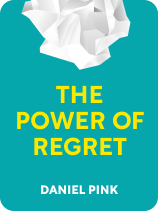

This article is an excerpt from the Shortform book guide to "The Power of Regret" by Daniel Pink. Shortform has the world's best summaries and analyses of books you should be reading.
Like this article? Sign up for a free trial here.
Has someone ever told you to live without regrets? Did you know this philosophy actually prevents you from living your best life?
The philosophy of “no regrets” may sound liberating, but in reality, it ignores the benefits of regret. In his book The Power of Regret, Daniel Pink counteracts the “no regrets” philosophy with four arguments that defend regret.
Here’s why you shouldn’t try to live without regrets.
The Philosophy of “No Regrets”
Pink explains that many people hold the view that they should live life without regrets. This philosophy appears in popular music, self-help books, commercials, and celebrity culture, just to name a few. Pink explains that this philosophy views regret simply as something to avoid because it is painful and because no one can change the past. Therefore, the reasoning goes, a life without regrets is well-lived.
However, Pink counters that this view is foolish and can even prevent people from living their best life. He makes four counterarguments which we will discuss in depth.
(Shortform note: Those who espouse the philosophy of “no regrets” may disagree with Pink’s characterization. Some claim the philosophy is not about never growing from mistakes, but about doing what is most important in life while you have the chance so that you have fewer regrets at the end. However, Pink still makes the case that this philosophy encourages people to view regret negatively, overlooking its universal nature and benefits, which we will discuss next.)
1) Regret Is Universal
Pink argues that regret is a natural and universal part of human psychology. People are hardwired for regret because, as we will see in the next section, regret benefits their survival. Psychologists have identified only two groups incapable of experiencing regret: small children whose brains are still developing, and people who have suffered acute brain damage. This suggests regret is a normal part of any healthy adult’s brain. Furthermore, research demonstrates that regret is one of the most commonly experienced negative emotions.
(Shortform note: Research in neuroscience supports the notion that humans are “hardwired” for regret. Specifically, neuroscientists have found that regret and remorse are consistently processed in the medial orbitofrontal cortex, a region of the brain in our foreheads just above the eyes. This supports the idea that the “hardware” for regret is simply part of our biology, and therefore regret is universal as Pink claims.)
2) Regret Improves Decision-Making
Pink cites studies that have found that regret helps people make better decisions. When people are encouraged to look negatively at a past decision and then given a second chance at making it, they’ll take much more time and consider a wider range of options before making a decision. In other words, regret inspires people to make decisions more carefully.
(Shortform note: While a little regret can lead you to be more careful and considerate in your choices, psychologists have found that an overwhelming amount of regret can lead to decision paralysis. Some people take feelings of regret to extreme conclusions about themselves, such as believing that they “always make the wrong decisions” and should therefore avoid deciding altogether. As we’ll discuss later in this guide, getting the full benefits of regret requires processing them in a healthy and productive way.)
3) Regret Improves Motivation
Pink explains that regret also has the power to improve people’s motivation and persistence. Studies have found that people encouraged to look negatively on their performance of a task would then invest more time and effort in the task given a second chance. By experiencing regret, they felt inspired to persevere beyond their usual effort.
(Shortform note: To tap into the motivational power of regret, it’s important to avoid letting your regret lead to rumination. Psychologists define rumination as repetitive or obsessive patterns of thought dwelling on perceived failings and mistakes. Self-critical rumination is associated with increased risks of depression, which is known to severely undermine a person’s motivation. Therefore, as you regret past actions, be mindful of repetitive or compulsive patterns of negative thinking.)
4) Regret Leads to Fulfillment
Lastly, Pink explains that regret has the power to help people live more meaningful and fulfilling lives. When people understand the things they regret in life, it can clarify the things they want most.
The four main categories of regret are stability, ethics, personal risk-taking, and relationships. Pink explains that these regrets provide an inverse reflection of the life we want. We want to build a strong foundation of personal stability, live according to our morals, take bold risks when pursuing our dreams, and form strong personal connections with others. By reflecting on your regrets, you’ll discover the true goals that will lead you to a more fulfilling life.
(Shortform note: In learning from your regrets, it’s important to note that any decision will lead to positives and negatives and therefore provide the potential for regret. For example, someone who gets married may regret feeling tied down, while someone who stays single may regret their lack of connection. Therefore, consider the things you might regret if you had chosen otherwise. Do they outweigh the regrets you feel now or are they about equal?)

———End of Preview———
Like what you just read? Read the rest of the world's best book summary and analysis of Daniel Pink's "The Power of Regret" at Shortform.
Here's what you'll find in our full The Power of Regret summary:
- A look at why most people feel regret, and what causes it
- The three worst ways to deal with regrets
- The five-step process for turning regrets into advantages






